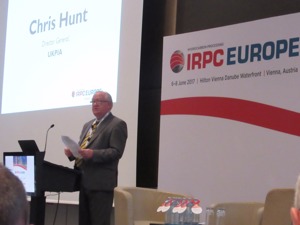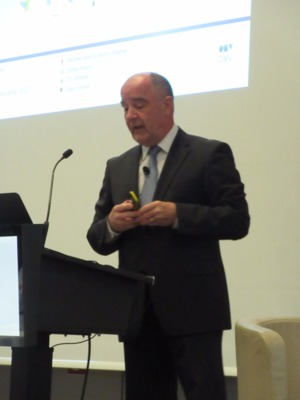IRPC Europe '17: OMV exec examines challenges facing EU refining industry
VIENNA—Director General of the UK Petroleum Industry Association Ltd. (UKPIA), Chris Hunt, delivered opening remarks on Day 1 of Gulf Publishing Company's International Refining and Petrochemical Conference (IRPC) Europe. Mr. Hunt invited attendees to network with one another during the conference against the beautiful backdrop of the Danube River.
Challenges for European refiners. Following Mr. Hunt's remarks, Executive Board Member of OMV Manfred Leitner delivered a keynote address on the outlook for the European refining industry. He noted that growth in the European refining and petrochemical sector is facing a number of challenges. These challenges include changing demand patterns, overcapacity, import pressures, the need for new business models, volatile fuel margins, tightening regulations, and high feedstock costs for petrochemicals.
Also, Mr. Leitner noted that unlike the US, Europe does not have cheap shale gas production to feed petrochemicals production, which keeps feedstock costs high for European propylene producers.
Diesel and alternative fuels. Changing demand patterns are another challenge. Transport will increase as GDP rises, but an alternative has not emerged so far for diesel, Mr. Leitner noted. Over the last two decades, the European automotive industry has focused almost exclusively on diesel engine manufacturing.
Although diesel engines were formerly looked down upon for their emissions, improvements have allowed diesel engines to burn cleaner than gasoline engines, which will provide impetus for further development and reliance on diesel-fueled automobiles.
European refiners are also working to expand the production, promotion and use of alternative and renewable fuels. However, alternative energies have not always taken off as expected.
"OMV runs five hydrogen stations in Austria—and there are five [hydrogen-fueled] cars," Mr. Leitner quipped. "We are waiting for the cars to come, but they are missing."
Refinery capacity consolidation. Refining capacity in Europe has fallen by 15% between 2010 and 2017—from 865 MMtpy to 740 MMtpy—and it is expected to decline by a further 15% by 2025, to 640 MMtpy. Many refineries have been idled or closed. These closures are largely due to the expansion of gasoline demand in the US, Mr. Leitner noted.
Also, refining capacities have been building elsewhere, particularly in Asia and the Middle East, to meet regional as well as global fuel demand. These new capacities will have a large impact on global markets, and particularly the European market, Mr. Leitner acknowledged.
Another trend—one that is also a consequence of refinery closures—is a rise in refinery utilization across the remaining European plants. "However, I will bet that refining margins will go down," Mr. Leitner predicted. "In 2017 so far, they are quite attractive, I must say. But this is a game very much supported by the oil price. As oil prices continue to go up steadily over time, it will be detrimental to our refining margins, and we have to be prepared for that."
Regulatory impact. Stricter carbon intensity targets and higher biofuels quotas over the short and medium terms will have significant impacts on European refiners. Over the long term, the Paris Climate Accord (COP21)—and the recent pullout of the US from the agreement—may also prove detrimental to the European refining industry.
Mr. Leitner opined that the US' recent decision to withdraw from the climate accord is due to the country being more concerned about its own economy and industry. As a major polluter, the US' withdrawal is expected to severely impact global plans to reduce carbon emissions and reduce the impacts of climate change.
Tackling market challenges. European refiners will need to increase their efficiency in a challenging market to compete with US refiners, which benefit from low feedstock costs and cheap shale oil production, Mr. Leitner said.
Various solutions for tackling these challenges include immediate actions, such as better cost management, continuous feedstock and yield optimization, and strong partnerships with suppliers.
Over the short and medium terms, European refiners must consider additional opportunities for plant site integration and refinery-petrochemicals integration, and securing market outlets with more strategic retail sales.
Over the long term, viable actions for addressing the challenges facing the European refining industry include partnering with end-users to increase future mobility. "It means: secure your sales," Mr. Leitner asserted. Extending the petrochemical value chain and considering alternative business models are other ways that European refiners can tackle the challenges they face over the medium and long terms.
IRPC Europe is taking place at the Hilton Vienna Danube Waterfront in Vienna, Austria, from June 6–8.









Comments